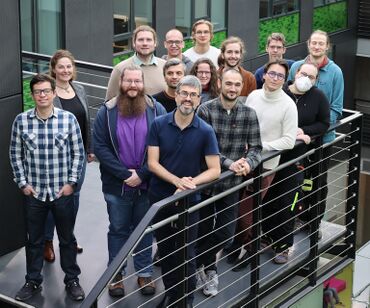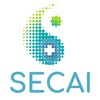Wissensbasierte Systeme
Wissensbasierte Systeme
- Kontaktperson Markus Krötzsch
- Sekretariat secretary_wbs@mailbox.tu-dresden.de
In der Forschungsgruppe Wissensbasierte Systeme beschäftigen wir uns mit Methoden der intelligenten Verwaltung und Verarbeitung von Informationen in Computersystemen. Unsere Arbeitsgebiete liegen dabei besonders im Bereich der symbolischen Künstlichen Intelligenz (KI) und der logischen Methoden in der Informatik. Dies umfasst Fragestellungen der Wissensrepräsentation und des logischen Schließens, der diskreten Optimierung und Problemlösung, sowie der Datenbanken. Unsere Arbeit verbindet dabei erkenntnisorientierte Grundlagenforschung mit angewandten Arbeiten bishin zur Entwicklung praktischer Systeme.
Die Forschungsgruppe ist am Institut für Theoretische Informatik der Fakultät Informatik angesiedelt und gehört darüber hinaus zum Center for Advancing Electronics der TUD.
Professoren und Gruppenleiter
- APB 3033
- +49 351 463 38486
Verwaltung
Wissenschaftliche Mitarbeiter
- APB 3031
- +49 351 463 43503
- APB 3029
- +49 351 463 38043
- APB 3035
- +49 351 463 43506
- APB 3037
- +49 351 463 43510
- APB 3029
- +49 351 463 38043
- APB 3032
- +49 351 463 42666
Techniker
- APB 3018
- +49 (0) 351 463-38422
Studentische und Wissenschaftliche Hilfskräfte
Ehemalige
- Ehemals Wissenschaftlicher Mitarbeiter
- Wissensbasierte Systeme, Logische Programmierung und Argumentation
- Ehemals Wissenschaftliche Mitarbeiterin
- Automatentheorie, Wissensbasierte Systeme
Neueste Publikationen
Komplette Publikationsliste anzeigen
Towards Mass Spectrum Analysis with ASP
Theory and Practice of Logic Programming, 1-23, February 2026
Details Download
Rule Rewriting Revisited: A Fresh Look at Static Filtering for Datalog and ASP
In Balder ten Cate, Maurice Funk, eds., Proceedings of the 29th International Conference on Database Theory, volume 365 of LIPIcs, to appear. Dagstuhl Publishing
Details Download
Supporting Risk Management for Medical Devices via the Riskman Ontology and Shapes
Proceedings of the 21st International Conference on Semantic Systems (SEMANTiCS 2025), 226 - 246, September 2025
Details Download
Verifying Datalog Reasoning with Lean
In Yannick Forster, Chantal Keller, eds., 16th International Conference on Interactive Theorem Proving (ITP 2025), volume 352 of Leibniz International Proceedings in Informatics (LIPIcs), 36:1-36:19, September 2025. Schloss Dagstuhl - Leibniz-Zentrum für Informatik
Details Download
Verifying Datalog Reasoning with Lean (Extended Abstract)
KR 2025 - Recently Published Research Track, November 2025
Details Download
Modern Datalog: Concepts, Methods, Applications
In Alessandro Artale, Meghyn Bienvenu, Yazmı́n Ibáñez Garcı́a, Filip Murlak, eds., Joint Proceedings of the 20th and 21st Reasoning Web Summer Schools (RW 2024 & RW 2025), volume 138 of OASIcs, 2025. Dagstuhl Publishing
Details Download
About the Multi-Head Linear Restricted Chase Termination
In Magdalena Ortiz,Renata Wassermann,Torsten Schaub, eds., Proceedings of the 22nd International Conference on Principles of Knowledge Representation and Reasoning (KR 2025), volume 22 of Proceedings of the International Conference on Principles of Knowledge Representation and Reasoning, 346-355, October 2025. IJCAI Organization
Details Download
Grounding Rule-Based Argumentation Using Datalog
In Magdalena Ortiz, Renata Wassermann, Torsten Schaub, eds., Proceedings of the 22nd International Conference on Principles of Knowledge Representation and Reasoning (KR 2025), 281–292, November 2025. IJCAI Organization
Details Download
Reliance-based Static Analysis of Existential Rules
Diploma Thesis, TU Dresden, August 2025
Details Download
Rational Inference in Formal Concept Analysis
In Peggy Cellier, Bernhard Ganter, Rokia Missaoui, eds., Conceptual Knowledge Structures. CONCEPTS 2025, volume 15941 of Lecture Notes in Artificial Intelligence, 325–341, September 2025. Springer
Details Download
Lehrveranstaltungen
- Complexity Theory (WS 2025)
- Knowledge Graphs (WS 2025)
- Formale Systeme (WS 2025)
- Concurrency Theory (SS 2025)
- Database Theory (SS 2025)
weitere Lehrveranstaltungen anzeigen
Studienarbeiten
Abgeschlossene Arbeiten
- Optimierung des logischen Schließens mit existentiellen Regeln durch die Analyse von Abhängigkeiten
- von Alex Ivliev (9 Dezember 2021)
- Betreuer: Markus Krötzsch
- Chase-Based Computation of Cores for Existential Rules
- von Lukas Gerlach (29 August 2021)
- Betreuer: Markus Krötzsch
- Evaluating the Generality of Disjunctive Model Faithful Acyclicity on OWL ontologies
- von Lukas Gerlach (31 März 2021)
- Betreuer: Markus Krötzsch, David Carral
- Don’t Repeat Yourself: Termination of the Skolem Chase on Disjunctive Existential Rules
- von Lukas Gerlach (30 September 2020)
- Betreuer: Markus Krötzsch, David Carral
- Software Implementation for Taxonomy Browsing and Ontology Evaluation for the case of Wikidata
- von Serghei Stratan (7 März 2016)
- Betreuer: Markus Krötzsch
- Visualisierung räumlich-zeitlicher Inhalte aus Wikidata
- von Georg Wild (4 September 2014)
- Betreuer: Markus Krötzsch
cfaed
CENTER FOR ADVANCING ELECTRONICS DRESDEN
CPEC
Grundlagen verständlicher Softwaresysteme
CeTI
Centre for Tactile Internet with Human-in-the-Loop
InnoSale
Innovating Sales and Planning of Complex Industrial Products Exploiting Artificial Intelligence
KIMEDS
KI-assistierte Zertifizierung medizinischer Software
Nemo
Ein schnelles, skalierbares und verlässliches Regelsystem
SECAI
School of Embedded Composite Artificial Intelligence
ScaDS.AI
Center for Scalable Data Analytics and Artificial Intelligence
Semantic MediaWiki
Beliebte Open-Source-Software zur gemeinsamen Datenverwaltung
Wikidata
Wikipedias freie, kollaborative Wissensbasis
Wikidata SPARQL Logs
Zugriffsprotokolle des Wikidata SPARQL Query Service
Adf-bdd
Abstract Dialectical Frameworks mit Binary Decision Diagrammen lösen












































